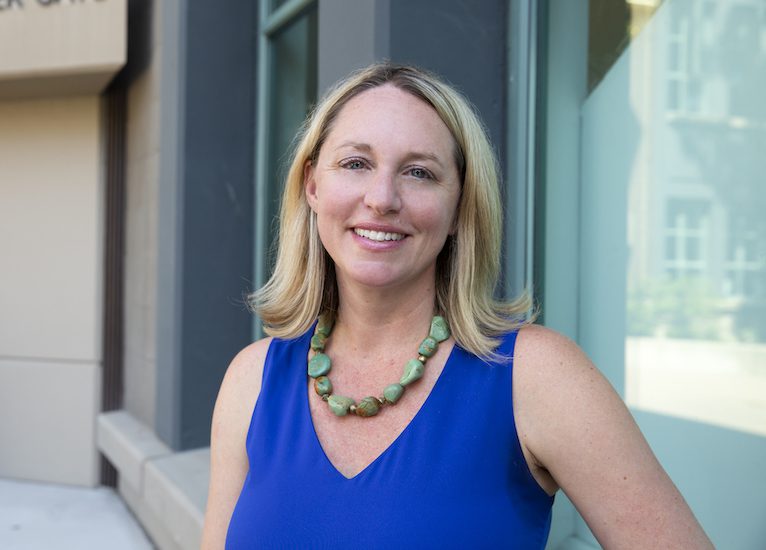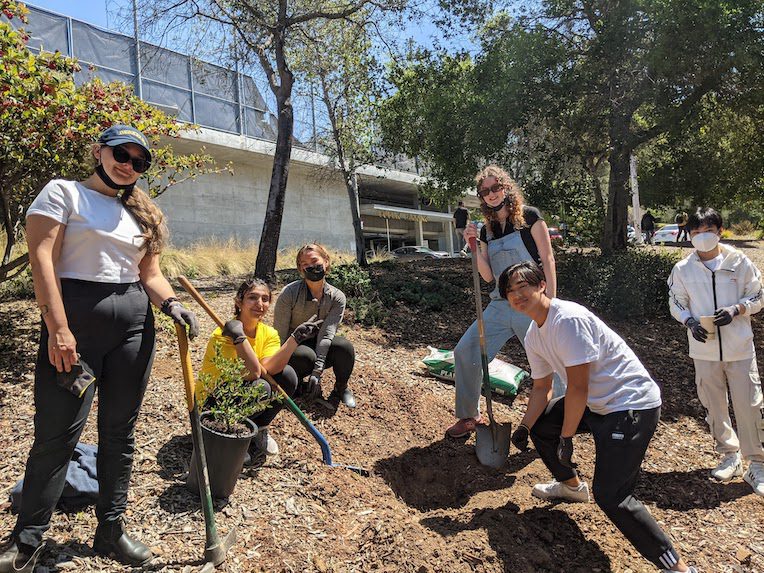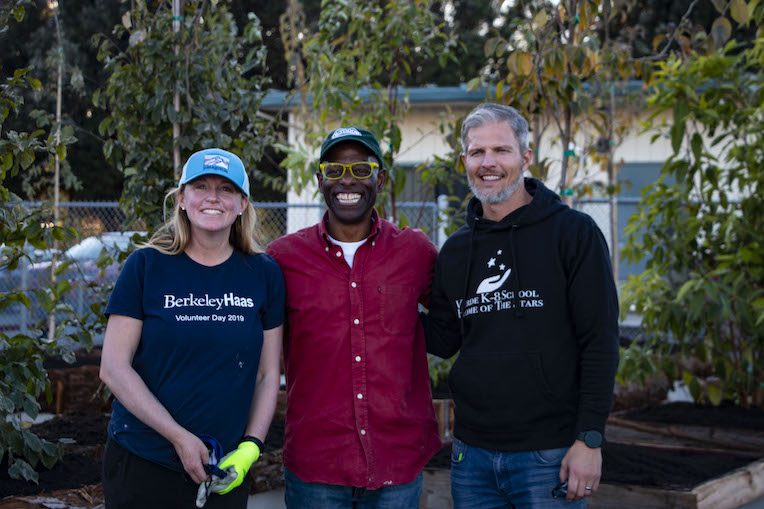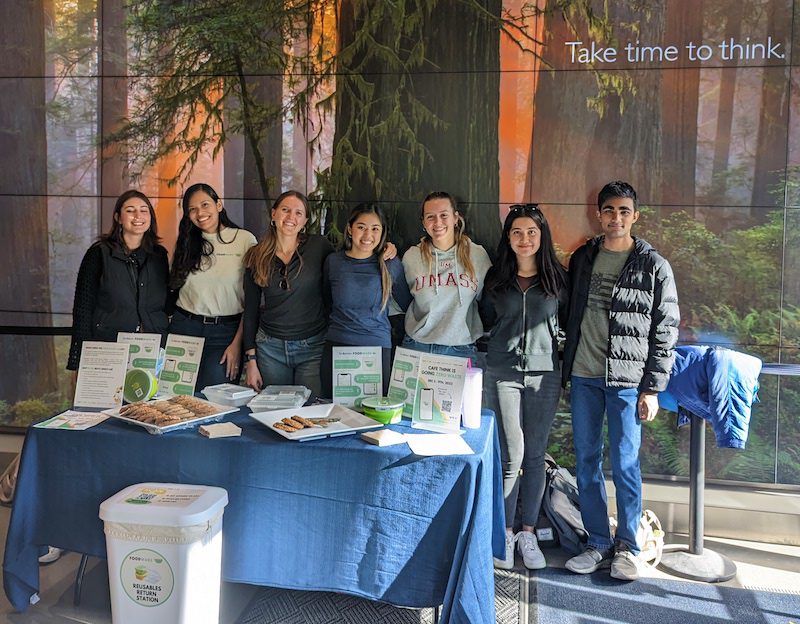
For more than six years, Danner Doud-Martin helped lead the school’s progress in sustainability—from leading the effort to make Chou Hall the first zero-waste building on campus to planting pollinator gardens around Haas to leading volunteers planting hundreds of trees in the community. Now, Doud-Martin, former assistant director of the International Business Development (IBD) Program at Haas, has been named the first full-time director of campus sustainability.
In her new role, one of her first projects is tapping what she learned in a night course to build a carbon roadmap for Haas that will quantify what sustainability goals Haas has attained so far and what remains to be done. Haas News recently interviewed Doud-Martin about her plans for further reducing waste, making Haas more energy efficient, and working across the UC Berkeley campus to be a part of the overall strategy for achieving net zero by 2025.
Over the past six years, you’ve worn two hats as assistant director of IBD and the school’s zero waste/sustainability lead. How did you turn the sustainability role into a full-time job?
We were able to earn three critical certifications, WELL Gold, TRUE (Total Resource Use & Efficiency) Platinum Zero Waste and LEED (Leadership in Energy & Environmental Design) Platinum for Chou Hall after more than a year of efforts to divert over 90% of landfill waste. That recognition helped lend legitimacy to the work that I was doing. It certainly helps when the dean says that sustainability is one of her strategic pillars because all of a sudden that work is elevated and folks are looking at it and asking questions. I feel really fortunate that Dean Harrison has made this a priority because it meant that I was able to convince Haas senior leadership that this is a full-time role.
I feel really fortunate that Dean Harrison has made this a priority because it meant that I was able to convince Haas senior leadership that this is a full-time role.
What are your first priorities?
One of the things about having a team and a true strategic plan is that our Office of Sustainability can spend time thinking through not only what zero waste means but understanding the data—and what we’re diverting from landfill. We also want to understand what emissions we produce at Haas and how we can reduce our scope 1, 2 and 3 emissions. Zero waste is a big part of our goal, but so is energy and transportation. I’m hoping that I’ll be able to understand Haas’ energy, water, and transportation data soon and that we will be able to tell the story of how Haas, within a huge university, is making significant reductions and changes.

What is Haas’s role in helping the UC Berkeley campus reach its zero waste goals?
UC Berkeley has committed to the strongest ban on plastic in the country and has mandated that we need to eliminate single-use plastic by 2030 Haas continues to be the place that the rest of campus watches. Zero waste is not only about Chou Hall but the initiatives that we’ve continued to roll out and/or pilot. The reusables (utensils, mugs, water bottles, etc.) program is one of them. We’re trying to think through how to make reusables work. There is a logistical piece: can they be washed on site or do they need to transported to be washed? What is the footprint? Are we really helping the environment with reusables versus a compostable?
How are you working now to eliminate plastic on campus?
This is about finding solutions to something as simple as eliminating single-use balloons and replacing them with vinyl reusable balloons that can be blown up many times. We’ve told our campus event planners about the vinyl balloons, so demand is up and we’ve expanded our inventory. We also want to completely eliminate single-use plastic water bottles from Haas, which is why we are planning graduation without plastic water bottles this year. We are all brainstorming on what we can provide to guests and graduates to replace plastic. Graduation gowns are another thing that we’re tackling. Haas has taken back graduation gowns for years and offers whatever is collected to next years’ students. We hope to scale this program to be able to eliminate single use gowns—and the UC Berkeley CAL Zero Waste team is trying to get it to happen campus-wide this year. They’re trying to turn it around fast. We’re really starting to put in these policies and find solutions.
We also want to completely eliminate single-use plastic water bottles from Haas, which is why we are planning graduation without plastic water bottles this year.
Haas moved away from plastics to “compostable” utensils years ago, and now your goal is to move away from these PLA single-use compostable utensils and clamshells made of materials like corn starch and sugar cane toward reusables. How compostable are the single-use “compostable” products?
You have to put all of it in a 40-day, high-heat commercial composting system. You cannot put it in your backyard compost.
Where do we send ours?
We send all of our composting to the Richmond Materials Recovery Facility (MRF), where we recently planted 150 redwood trees as part of our efforts to offset our paper use through printing. We also planted trees at Verde Elementary School across the street from the MFR in an effort to green their school yard.

How does the reusables program work?
FoodWare, a student startup that we’ve been working with since last spring, helped us replace 4,200 clamshell food containers with reusable containers between spring and winter of 2022. Our goal for the next semester is 6,500. The Dean’s Speaker Series lunches are done completely with reusables. We are having conversations with all the different program offices about expanding reusables at their events. I’m also working with a student team that’s part of a course called Zero Waste Lab. They’re going to put together a lifecycle analysis for us that will show the environmental and financial footprint of a compostable clamshell versus a reusable one. Reusable cutlery is a dream of mine because those are the hardest things to break down.
How has the pandemic impacted support for the reusable strategy?
We’ve seen pushback with reusables, specifically because of fear of COVID. We’ve been slowly working to get both our catering and the cafe back to a place of comfort around health protocols and reusables. This semester, Café Think is taking reusable mugs and filling them with coffee drinks. Guests save 25 cents each time they refill a reusable. Haas also gave all full-time MBA students bamboo utensil sets this year, building on the water bottles and coffee mugs given out a couple of years ago. It’s all about behavior change. I keep my bamboo utensil set in my purse at all times. When you see people pulling out their own forks, you feel more comfortable doing it.

How do you inspire more people to make the changes you need them to make?
Lots of education and incentives. Fill It Forward, a company we have partnered with over the years, makes an app that works with barcodes to track when you refill your water bottle or coffee mug. It sends the information to a central hub and tracks your impact. Fill It Forward also has a mission to donate water to communities in need. As we know, students like to have things gamified and many of these apps offer prizes for engaging. Now that I’m in this role 100%, I can think about how to utilize more incentives and gamification to engage people more and create behavior change.
Can you talk about planned upgrades to systems in other campus buildings, beyond Chou Hall?
We’re trying to figure out how to make energy-saving improvements and whether we can install solar in our Faculty Services, Cheit, and Student Services buildings. But our first priority is the new Berkeley Haas Entrepreneurship Hub. As the hub is being renovated, we have to think about what we can do during the construction and operations phases to hit all of the sustainability points. Because this is a renovation rather than new construction, we won’t be able to have the same level of certification on this project that we had with Chou, but I’m looking at what we can do in a smaller building. Regardless, we want to push ourselves to make a significant impact wherever we can from a sustainability standpoint.